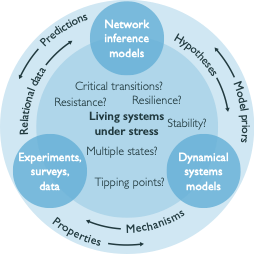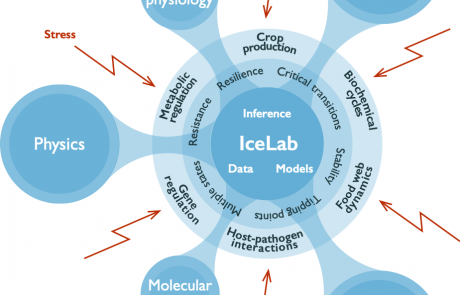FUNDING NEWS: Center for modeling adaptive mechanisms in living systems under stress at IceLab
Martin Rosvall, together with Åke Brännström, Sebastian Diehl, Maria Fällman and Åsa Strand of IceLab have been awarded 30 million sek by the Swedish Research Council to establish a new center of excellence within IceLab: the Center for modeling adaptive mechanisms in living systems under stress.
This funding represents a huge success and a promising future for IceLab. 125 applications were received and 15 awarded, with this Center the only one to be established within Umeå University.
Within this Center there will be a new research school, master’s program, extended stays from international researchers, recruitment of new tenure-track researchers and multidisciplinary postdoctoral fellows.
Other IceLab members Ludvig Lizana, Eric Libby and Gabrielle Beans will contribute to the development and success of the Center.
Research Theme
Many living systems of global societal relevance are reacting in alarming ways to ever-increasing levels of human-induced stress. Examples include the accelerating loss of biological diversity, the decline in crop productivity and the rise of antibiotic resistance. Progress has been slow towards understanding the mechanisms governing stress – the reactions of these and other living systems, making the prospect of reversing harmful trends less likely.
In the application, the researchers argue that the adaptive behavior of living systems shares fundamental similarities across organisatory scales – from cells to ecosystems – and that pioneering understanding of stress responses from living systems requires an integrated approach that transcends disciplinary boundaries.
IceLab will establish one multidisciplinary complexity center to attack research questions related to how living systems reacts to stress:
Can we discover universal adaptive mechanisms that drive or inhibit critical transitions in living systems under stress?
and
How can living systems be protected, managed or even engineered to avoid harmful ones transitions, maintain critical functions and improve desired properties?
In the center, two cutting-edge research methods will be intertwined: an integrated process that involves experiments, network models – and process-based dynamic models that can be used to elucidate research of living systems under stress across biological organizational scales and scientific disciplinary borders.
Using an integrative approach, modeling tools required to solve important societal challenges will be developed, for example identifying promising bacterial factors that can be tested as targets for new antimicrobials, provide new tools for plant breeding to increase crop yields and suggest more effective environmental plans.


